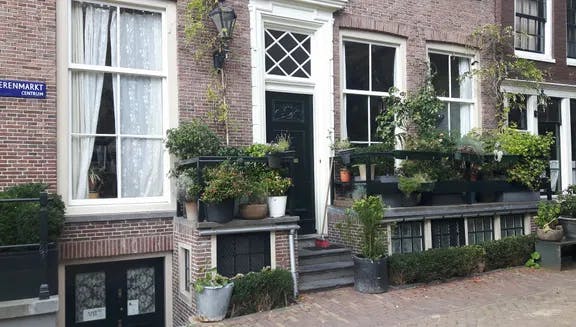
6 insider secrets for securing a Dutch mortgage
Article provided by Expat Mortgages, an IN Amsterdam partner.
The mortgage on a house is a large personal investment - life’s biggest for a lot of people - and it can be daunting to sort out the details in a foreign language outside of your home country. Luckily, in Amsterdam there are lots of services and systems to make things easier. We spoke to Henk Jansen, founder of Expat Mortgages, to find out what steps to take to streamline the process. “If I had to sign something that important in a language I couldn’t understand, I would be terrified,” said Jansen. “That’s why we take our clients by the hand and support them until they live in their new home. And even after that. We’re with them through the whole journey of being a homeowner.” So how do you make that journey as smooth as possible?
Start with a baseline understanding of the Dutch mortgage system
Insider tip: Attend a free seminar aimed at internationals such as those hosted by Expat Mortgages where you can meet with estate agents, mortgage advisors, notaries and tax lawyers. Ask your questions and get a free personalised consultation. “There is no commitment at these events,” says Jansen. “We really just want people to be prepared and informed, even if they end up using one of our competitors.”
Find out if you qualify for a mortgage
You’ll need a Dutch BSN number, a local bank account, a Dutch address and taxable income. Beyond that, the Netherlands helps people in a wide range of different circumstances buy homes here. Your mortgage broker can work with you to figure out if you are a good candidate for a local mortgage.
Insider tip: Make sure your credit meets the guidelines by checking BKR.
Know your price range
If you use a mortgage agent, they’ll give you an official quote so you can narrow your search to houses you can afford. This is the moment to make a “need to have” and “nice to have” list, before you are caught up in the excitement and emotions of actually viewing houses.
Insider tip: Wondering what income you need to qualify for a €400,000 house, for example? You can get a ballpark budget based on your income through this online tool.
Use a buying agent
Mortgage agents sort out the financial aspects of buying a home — finding a bank that will give you the loan; negotiating the best possible mortgage terms; making sure the mortgage has clauses, provisions and policies that protect your investment; and after-sale care — but they don’t help with finding the house and negotiating the sale. For that, you’ll need a buying agent, which usually costs 1-2% of the house price. You could try to handle this process on your own, but you are much more likely to get the house you want if you use a local agent who has relationships with the selling agents.
Insider tip: You can find out the backstory of a house by running a search at Kadaster. It costs €6 for an extract, which will tell you who owns the house, when they bought it, how much they paid for it, and in some circumstances, what is still left on the mortgage. It provides information that could prove interesting while you are negotiating. Estate agents have free access to the service, so if you are working with a buying agent they can pull reports for you.
Understand what you are signing
Don’t be afraid to ask questions. You should know the type of mortgage you are getting (there are a few different options in the Netherlands) and if the house is leasehold or freehold. You may also be able to get into a lower risk category, resulting in a discounted interest rate. And, perhaps most importantly, you should make sure your preliminary purchase contract comes with a conditions-subsequent or dissolving clause to obtain a mortgage. This means if you sign the papers but the bank doesn’t give you a mortgage, you are not liable for the purchase. If you don’t have the dissolving clause and, for some reason, your mortgage isn’t approved, you’ll be responsible for paying 10% of the cost of the house.
Insider tip: Once you’ve made a verbal agreement to buy the house, let your mortgage agent know immediately. It can take 5-10 days for the notary to draw up the contract, which is valuable research time for your mortgage agent to vet the property, conducting technical checks and structural surveys. And once the contract has been issued, try to close the deal on a Wednesday. There is a three-day cooling-off period after signing when you can cancel without penalty, so if you sign on a Wednesday, that gives you until the following Monday to back out if you realise the house doesn’t meet your needs. Or if you just get cold feet.
It doesn’t stop with the keys
Re-evaluate your mortgage after a few years and make sure you are still optimising your payment plan. In some circumstances, you can make additional lump payments to bring down the monthly mortgage.
Insider tip: If you work with a mortgage agent, ask if they will organise your monthly tax rebate for your mortgage payments. Some mortgage agencies will include this service for free for the first year or two of your mortgage.
This article was published in collaboration with Expat Mortgages. If you have any questions about securing a mortgage or would like to sign up for one of their free workshops, contact them here.
Related articles

How to transfer a mortgage

Buy property in the Amsterdam Area

Why buy rather than rent a home in the Netherlands?

The mortgage market in the Netherlands

8 steps to buying a house in the Netherlands

What short-term residents should bring to Amsterdam

Overview of housing rights in the Amsterdam Area

Rent property in the Amsterdam Area

Tips on avoiding housing scams in Amsterdam
